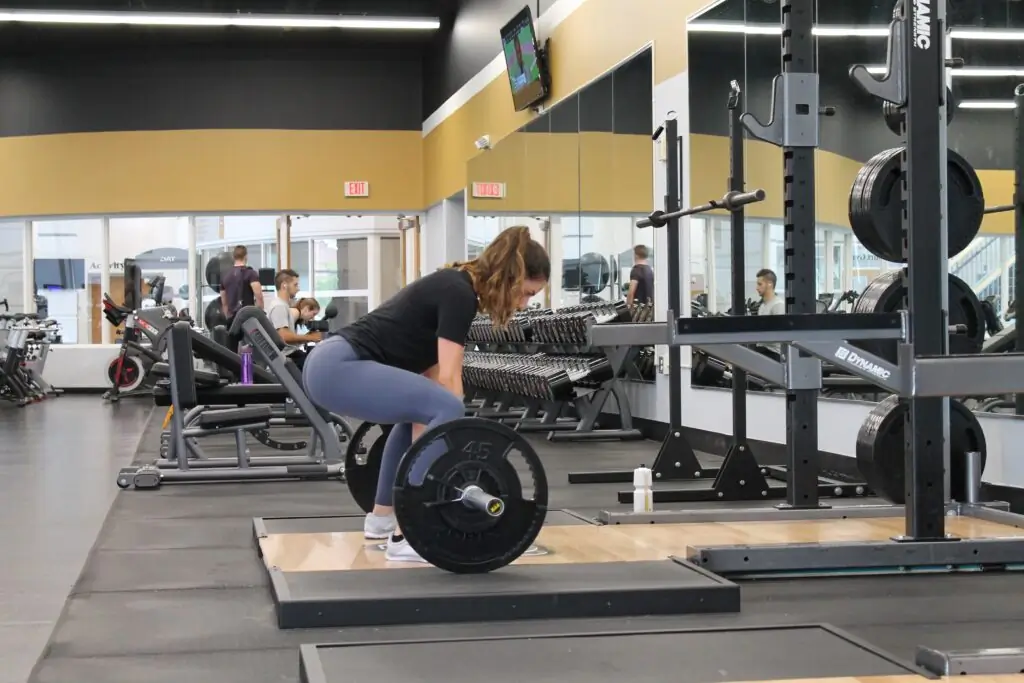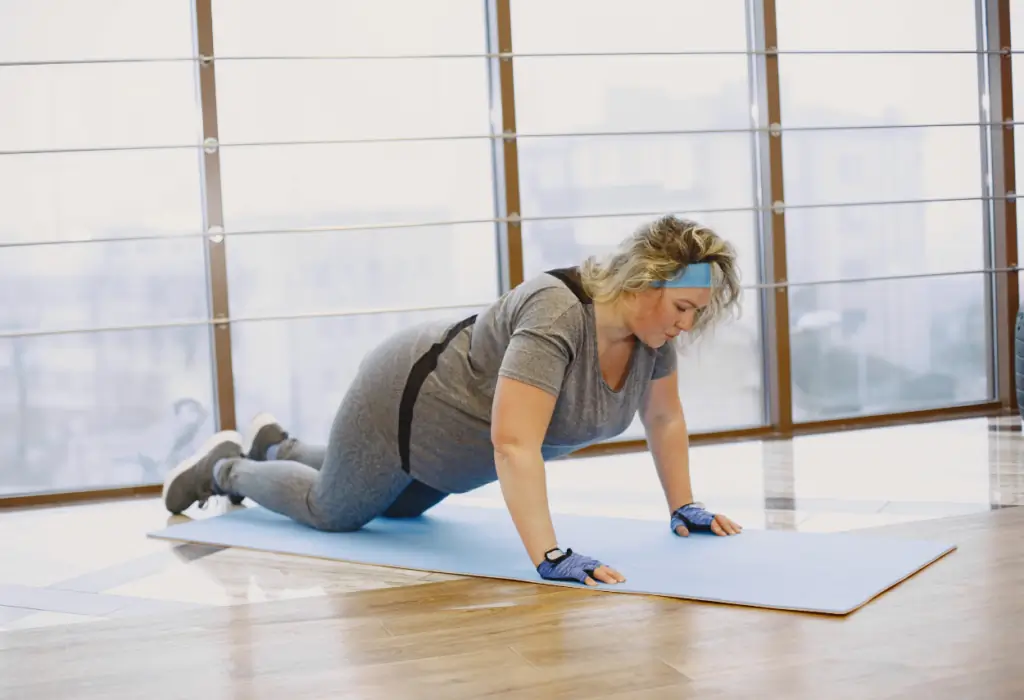
I’m a runner. All summer, all winter, through rain, snow, sun, and even a bit of wildfire smoke. For half the year I start many of my runs before the sun comes up.
And, yes, sometimes I worry. I have been harassed. I have changed my running route. I do carry a whistle.
Some people would say the logical answer is to move my workouts indoors. As in, to a gym.
But some of you are already cringing at that suggestion, aren’t you? If you’re a gym enthusiast that’s great for you — but for many women the thought of working out in public elicits a feeling along the lines of … ugh.
Why is working out sometimes so awkward?
Maybe you know exactly what you don’t like about the idea of visiting a gym. Or maybe you can’t quite nail it down — you just know it makes you uncomfortable. Here are a few of the reasons you might not be into the gym vibe:
It might be society
Perfectionism and body image: Oh, yeah — that old thing of society having an idealized (and unrealistic) notion of what bodies should look like.
Gender norms: Women, in particular, may face gender-specific pressures to dress, act, or look in an expected, “feminine” way.

Or you might be your own worst enemy
Comparing yourself to others at the gym: You’d never tell yourself you’re less skilled, or don’t use the equipment as well as them, right?
Self-consciousness: It’s hard to enjoy your workout if you’re worried about sweating, going red in the face, or your general appearance.
Clothing and gear: Worrying about having the “right” workout clothes or gear is definitely going to add stress.
It could be your past
Previous negative experiences: If you’ve felt judged, uncomfortable, or not welcomed in a gym environment before, it stands to reason you’d be reluctant to go back.
Early life experiences: How did things go for you in phys. ed. class at school? If the answer is, “not great,” it’s no surprise you might hesitate to do physical activity in public now.
It might be baked into your personality
Fear of making mistakes: If you’re worried about using a machine incorrectly or not being able to complete an exercise, a visit to the gym is going to be intimidating.
Disliking being the centre of attention: The mere thought of being observed while exercising can be daunting if you’re a natural introvert, or just plain shy.
You might feel external pressure
Cultural attitudes to exercise: In your culture is public exercise and physical exertion something to embrace … or be embarrassed by? It’s natural for your culture’s norms to affect your thinking.
Community and family expectations: Did you grow up in a very reserved community? Is your family artistic, or musical … or anything but physically active? It can be hard to buck these expectations.

How can you overcome your anxiety?
You may be crystal clear that the gym makes you feel uncomfortable, and you may even have some insight as to why, but if you still want to commit to exercise, and if the gym is the best place to do that, you need to consider the four Ps: planning, psychology, partnering, and practicing self-compassion.
Plan ahead
Map out your visit: You’ll feel less out of place if you have a focused, purposeful workout plan which starts with exercises you already feel comfortable with.
Get familiar: Visiting the gym during off-peak hours or scheduling a tour can help you feel comfortable there and reduce anxiety.
Wear clothes that make you feel good: Selecting workout clothes that make you feel comfortable and confident can significantly impact your self-perception and reduce embarrassment.
Set goals: Determining and working toward your personal fitness goals is a great way to avoid comparing yourself to others in the gym.
Let psychology help you
Cognitive reframing: Challenge and reframe negative thoughts about the gym experience. For example, instead of thinking everyone is judging, consider that most are focused on their own workouts (which is probably true!).
Mindfulness: A technique like deep breathing can help with more than just getting through a tough set of lunges — it can also help you manage anxiety symptoms.
Gradual exposure: Start with shorter, less intense gym sessions and gradually increase duration and intensity as you get more comfortable.
Positive affirmations: The words, “I have every right to be here and each workout makes me healthier and brings me closer to my goals,” are just as easy to say as, “I have no idea what I’m doing and I shouldn’t be here.” I know which ones would make me feel better.
Partner up
Buddy system: Most things are better with a friend — that can include working out.
Be a joiner: Participating in group fitness classes can create a sense of community and belonging — you’re not in this alone!
Practice compassion (for yourself)
Accept your feelings: Recognize that feeling anxious is normal and not a sign of weakness.
Celebrate all wins: Acknowledging every little bit of progress you make will help build confidence and shift focus from embarrassment to accomplishment.

Practical tips to stop being embarrassed about working out
How to work out
If you’ve never worked out in a gym before — or if it’s been a really long time — here are some basic etiquette tips to keep in mind. (We promise — they’re mostly common sense!)
Wipe down equipment: Do unto others …
Respect personal space: Post-pandemic, this is one we should all be good with.
Share equipment: This is particularly important during peak hours — everybody else wants to get through their workout just as much as you do.
Keep the noise down: The gym isn’t the place for loud conversations … and avoid dropping equipment loudly.
Limit socializing: Be mindful of others’ focus during workouts; socialize in designated areas.
Mind the mirrors: Avoid blocking others’ views in mirrors.
What exercises to do
As for the actual exercising, there’s no need to get complicated or fancy. There are a number of tried-and-true foundational exercises that will give you great results. Ask your health practitioner, ask a gym employee, or turn to a trusted source of exercise information, such as:
- Federal government resources, like CCOHS: Exercises for a Healthy Back
- Your local public health unit (Strength and Balance Exercises – Ottawa Public Health)
Trusted associations, like Exercise | Osteoporosis Canada, or Exercise & activity – Diabetes Canada
Where to work out
There are large, familiar chains found in most towns and cities across the country. These are often well-equipped with knowledgeable staff. However, if those don’t feel right for you, there are more and more gyms opening which cater to traditionally underserved groups.
Add terms like inclusive, accessible, beginner, family-friendly, or whatever your particular need is, into your search and see what comes up. Many people also find that gyms run by a local municipality or community group have a more relaxed atmosphere (and may also be less expensive if subsidized by your taxes).

You can do it
If starting in a public gym still feels like too much, you can always explore the huge number of free and paid work-out-at-home apps, or you may find a few private sessions with a personal trainer are worth the investment to transition you to a gym environment.
This approach works for our nutrition and muscle-health expert, Dr. Carla Prado, at this stage in her life. “I have a personal trainer who’s online, and she has a platform I use. I manage 25 people, I have a young child, I have to look after my house. Having access to these exercises so I can finish my day and put a show on TV and exercise from home — it really works.” (Don’t miss Dr. Prado’s expertise on nutrition and muscle health, shared in our previous stories!)
You might be an exercise newbie (in which case, today is always the best day to start), or coming back from an injury (congratulations!). You might be trying to conquer social anxiety (working on your physical health is always a good move), or facing body image barriers (this is about you, not the mirror), or dealing with performance pressure (the only person you’re accountable to is yourself).
Whatever your story is, it’s amazing that you want to improve your health. Maybe that’s in a gym environment, or maybe you need to take some time to get there — whatever way you do it, as long as you’re mindful not to put yourself at risk, is fantastic and we applaud you.
If you currently exercise, are you Team Gym, or not so much? And if you want to get into exercise, will you start at a gym? Send us your thoughts and stories about your exercise journey.








